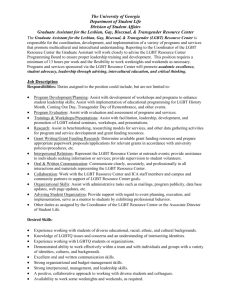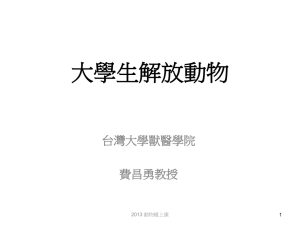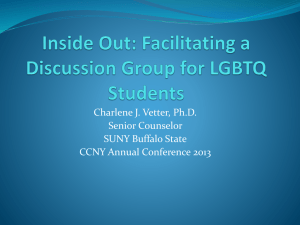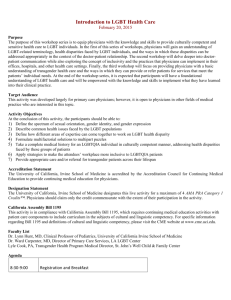LGBT health
advertisement
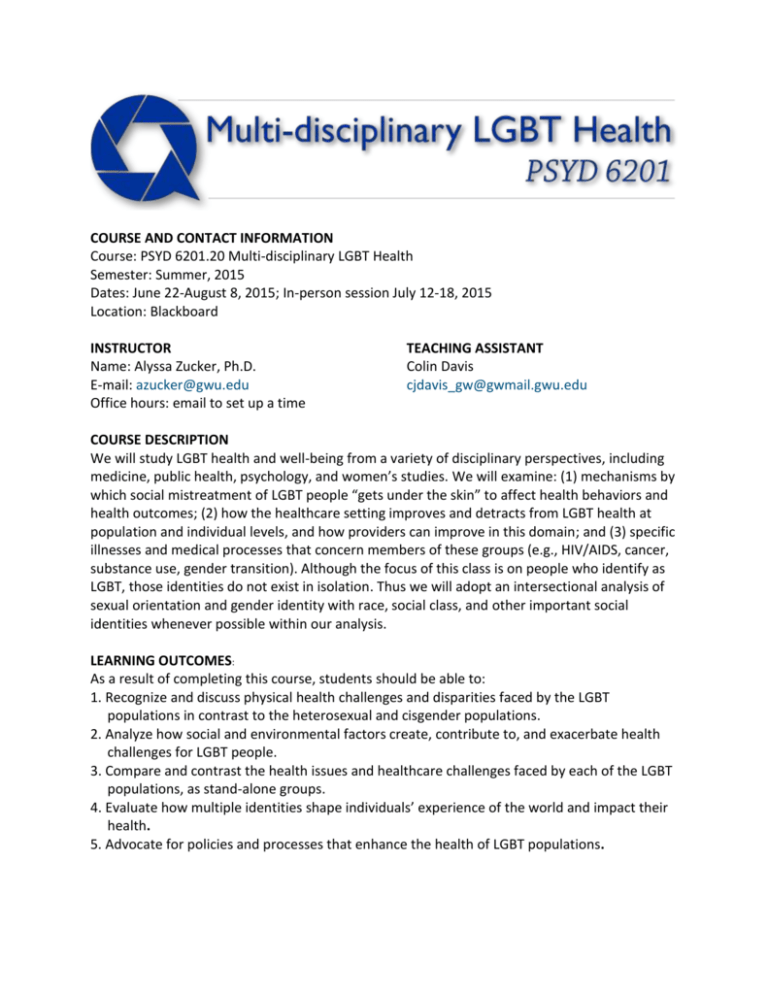
COURSE AND CONTACT INFORMATION Course: PSYD 6201.20 Multi-disciplinary LGBT Health Semester: Summer, 2015 Dates: June 22-August 8, 2015; In-person session July 12-18, 2015 Location: Blackboard INSTRUCTOR Name: Alyssa Zucker, Ph.D. E-mail: azucker@gwu.edu Office hours: email to set up a time TEACHING ASSISTANT Colin Davis cjdavis_gw@gwmail.gwu.edu COURSE DESCRIPTION We will study LGBT health and well-being from a variety of disciplinary perspectives, including medicine, public health, psychology, and women’s studies. We will examine: (1) mechanisms by which social mistreatment of LGBT people “gets under the skin” to affect health behaviors and health outcomes; (2) how the healthcare setting improves and detracts from LGBT health at population and individual levels, and how providers can improve in this domain; and (3) specific illnesses and medical processes that concern members of these groups (e.g., HIV/AIDS, cancer, substance use, gender transition). Although the focus of this class is on people who identify as LGBT, those identities do not exist in isolation. Thus we will adopt an intersectional analysis of sexual orientation and gender identity with race, social class, and other important social identities whenever possible within our analysis. LEARNING OUTCOMES: As a result of completing this course, students should be able to: 1. Recognize and discuss physical health challenges and disparities faced by the LGBT populations in contrast to the heterosexual and cisgender populations. 2. Analyze how social and environmental factors create, contribute to, and exacerbate health challenges for LGBT people. 3. Compare and contrast the health issues and healthcare challenges faced by each of the LGBT populations, as stand-alone groups. 4. Evaluate how multiple identities shape individuals’ experience of the world and impact their health. 5. Advocate for policies and processes that enhance the health of LGBT populations. TEXTS The following two texts are the only materials that can be purchased. The rest of the course readings are available in Blackboard in the weeks or under Electronic Reserves. Eliason, M. J., Dibble, S. L., DeJoseph, J., & Chinn, P. (2009). LGBTQ cultures: What health care professionals need to know about sexual and gender diversity. Online: Lippincott Williams & Wilkins. [Referred to as LGBTQ Cultures throughout the course.] This book is available in e-book format only. You can download it to an e-reader and also download PDFs of the chapters. You may purchase this book by going to http://www.nursingcenter.com/lnc/journalarticle?Article_ID=870947 ] Makadon, H. J., Mayer, K. H., Potter, J., & Goldhammer, H. (Eds.). (2015). Fenway guide to lesbian gay, bisexual, and transgender health (2nd edition). Philadelphia: American College of Physicians. [Referred to as Fenway throughout the course.] Although I am only assigning three chapters from this book, it will be one of the texts in other courses as well. It is available on Amazon and other online retailers. The remainder of course readings are available for download on Blackboard. Bowleg, L. (2013). “Once you’ve blended the cake, you can’t take the parts back to the main ingredients”: Black gay and bisexual men’s descriptions and experiences of intersectionality. Sex Roles, 68 (11-12), 754-767. DOI 10.1007/s11199-012-0152-4 Burke, P. (2013, May 3). Jason Collins is out. But in professional sports, ignorance is still in play. The Washington Post. Dubois, L. Z. (2012). Associations between transition-specific stress experience, nocturnal decline in ambulatory blood pressure, and C-reactive protein levels among transgender men. American Journal of Human Biology, 24, 52-61. DOI 10.1002/ajhb.22203 Goins, E. S., & Pye, D. (2013). Check the box that best describes you: Reflexively managing theory and praxis in LGBTQ health communication research. Health Communication, 28 (4), 397-407. DOI:10.1080/10410236.2012.690505 Halkitis, P. N., Wolitski, R. J., & Millett, G. A. (2013). A holistic approach to addressing HIV infection disparities in gay, bisexual and other men who have sex with men. American Psychologist, 68 (4), 261-273. DOI:10.1037/a0032746 Herrick, A. L., Stall, R., Chmiel, J. S., Guadamuz, T. E., Penniman, T., Shoptaw, S., Ostrow, D., & Plankey, M. W. (2013). It gets better: Resolution of internalized homophobia over time and associations with positive health outcomes among MSM. AIDS and Behavior, 17, 14231430. DOI 10.1007/s10461-012-0392-x Logie, C.H., James, L., Tharao, W., & Loufty, M. R. (2012). “We don’t exist”: A qualitative study of marginalization experienced by HIV+ lesbian, bisexual, queer and transgender women in MULTI-DISCIPLINARY LGBT HEALTH 2 Toronto, Canada. Journal of the International AIDS Society, 15, 1-11. http://dx.doi.org/10.7448/IAS.15.2.17392 Meyer, I. H., & Frost, D. M. (2013). Minority stress and the health of sexual minorities. In Patterson, C. J., & D’Augelli, A. R. (Eds.). Handbook of Psychology and Sexual Orientation. New York: Oxford University Press. Morrison, S., & Dinkel, S. (2012). Heterosexism and health care: A concept analysis. Nursing Forum, 47 (2), 123-130. doi: 10.1111/j.1744-6198.2011.00243.x. Poteat, T., German, D., & Kerrigan, D. (2013). Managing uncertainty: A grounded theory of stigma in transgender health care encounters. Social Science & Medicine, 84, 22-29. http://dx.doi.org/10.1016/j.socscimed.2013.02.019 Simoni, J. M., Smith, L., Lehavot, K., Fredriksen-Goldsen, K., & Walters, K. L., (2013). Lesbian and bisexual women’s physical health. In Patterson, C. J., & D’Augelli, A. R. (Eds.). Handbook of Psychology and Sexual Orientation. New York: Oxford University Press. COURSE STRUCTURE The class will meet online for weeks 1-3 and 5-7. Week 4 is the program’s summer residency and there will be opportunities to discuss aspects of this course during that time. The Schedule below an overview of the types of work required, and due dates, for the course. Within each week’s section, there is a detailed, sequential list providing the readings, media and activities for that week. As much as possible, please try to complete work in the order in which it is presented. While online, we will be completely asynchronous. This means that you can do your work (reading, viewing, posting, etc.) at any time, as long as you complete it by the due date. It is important to note that the weekly schedules always list the final date and time that work is due. Please plan your work schedules accordingly to meet those due dates. All work is due by 11:59 p.m. Eastern time, and it is your responsibility to adapt to Eastern time if you are working from a different time zone. ASSIGNMENTS Discussion Posts Because we will be meeting online (rather than in person) for most of the semester, the discussion boards are a major way that we communicate our thinking with each other. For each topic, you must post at least twice to the relevant discussion board forum on Blackboard. Beyond this minimum, please comment as often as you like. In your first posting, you respond to the question prompt provided. Strong first responses are those that o Demonstrate that you have read and viewed the weekly course content o Reference more than one assigned source (from the given week or a previous week) MULTI-DISCIPLINARY LGBT HEALTH 3 o Compare and contrast evidence o Present original thinking Posts do not need to do all of the above to be considered successful; these are some ideas for what I will be looking for. In terms of length, consider writing approximately a paragraph. A good standard to follow is to make it so that you don’t have to scroll down to read the whole posting. The second and subsequent responses are comments to your fellow classmates. Please respond thoughtfully. I have created a grading rubric that I’ll use to evaluate your discussion board posts. You can see it by clicking into a forum on Blackboard, then choosing Grading Information and View Rubric. Journal Entries At several points throughout the course, I will ask you to write in the Journal area of Blackboard to contemplate and analyze your personal response to some of the issues we are studying. For instance, there will be journal assignments to forward our learning goal on advocating for policies and processes that enhance the health of LGBT populations via being an effective ally. I will also ask you to use the journal feature to track changes in your thinking over the course of the class. Unlike discussion posts, journal posts are private and can only be viewed by you and me as your instructor. Knowledge check-ins Because we are meeting at a distance, I will be using knowledge check-ins as a way to gauge your comprehension of the reading, focus our understanding of the material, and know if there are places I need to clarify information. Check-ins consist of a few short quiz-like questions that will be graded on a pass/fail basis. Term paper Your major writing assignment will be an 8 – 10 page research paper on a topic pertaining to LGBT health that interests you. There are three parts to submit: (1) paper proposal, (2) rough draft; (3) final paper. A submission schedule is provided below. You may choose a topic covered together in class, or something entirely different (if you have concerns about whether your topic is appropriate, please contact me). I expect that you will bring your particular interests and training to this paper; any topic can be approached from a variety of disciplines and perspectives. The format you choose for your paper should also fit what you hope to accomplish. Two formats to consider are a literature review or a report on data you have collected. Sources You should cite a minimum of 8 references in your paper. MULTI-DISCIPLINARY LGBT HEALTH 4 Use mostly scholarly work (both theoretical and empirical). If, additionally, you analyze news stories, blogs, etc., be clear when you are doing so. The resources of GW's Gelman library are available to you as a student in this course. For basic library access, visit http://library.gwu.edu/ . You may find the Medline and PsycINFO databases to be particularly helpful in identifying sources. See the Term Paper link on Blackboard for help with accessing and using these databases. Writing Style and Format It is fine to use the first person (e.g., I think…) in your writing. However, please be consistent throughout the paper. Please pick a citation style and use it consistently throughout your paper for both intext citations and the reference section. Although I am partial to the Publication Manual of the American Psychological Association (6th Ed), I am not opposed to other styles. Additionally please type, double-spaced, in 12 point font. Margins should be 1-1.25 inches all around. Expectations Your paper should be framed in a way that matches what you hope to learn. For instance: o You may frame this paper as a literature review, reporting on the state of the field in terms of existing research and providing a unique analytical/critical perspective on the literature. o You do not need to collect and analyze empirical data. However, if you have an existing dataset that you would like to utilize, that is fine. In that case you could write up the paper as a research report, which would include a literature review (with hypotheses), method, results, and discussion sections. You should incorporate some of the core theory/concepts from class content (e.g., how discrimination affects health) into your paper You should address the intersectionality of identity statuses (e.g., gender, race, class, etc.) in some way. For example, if you are writing about bisexual people and STIs, include an analysis of how “bisexual” is not a monolithic category. It is fine (but not required) to propose concrete solutions for change on your topic. Evaluation I provided grading rubrics on Blackboard (click on the Term Paper link). Checking these rubrics in advance will give you more information on how I will evaluate your paper. Aim to get full credit by addressing everything under the Proficient column. Iterations MULTI-DISCIPLINARY LGBT HEALTH 5 The paper is due in parts so that you have multiple chances to get feedback on your project, and to be able to create an improved end-product through revisions of earlier drafts. Steps Paper Proposal -general statement of topic -preliminary reference list (formatted in APA or your preferred style; do not just list hyperlinks) -more detailed outline (optional) Due Date July 9 Rough Draft -complete draft of your paper July 26 Final Draft -final version of your paper, incorporating earlier comments August 8 COURSE GRADING Assignment Discussion Posts Journal Entries Knowledge check-ins Paper Proposal Paper Draft Paper Final Point value 4 2 2 5 17 30 Number 8 4 4 1 1 1 Total points 32 8 8 5 17 30 CLASS POLICIES Communication policy: There is a Q&A discussion forum on Blackboard, which is an excellent way to ask for help from the instructor, TA, and other students. I prefer that you use this discussion forum if you think others might share your question (e.g., clarifying a homework assignment). I will check the board daily. (Hint: you can subscribe to this discussion board so that you are notified by email whenever someone posts to it). I will respond to email within 24 hours on weekdays and at least once on weekends. Please use email instead of the Q&A board for personal questions (e.g., asking for an extension). I will be communicating with you through Blackboard, which is linked to your GW email account. Therefore you must either a) check your GW email on a daily basis or b) forward your GW email to another address that you check daily. MULTI-DISCIPLINARY LGBT HEALTH 6 Late work: Students should meet due dates for all assignments. If you are not able to meet a due date, please email me (in advance if possible) to inquire about an extension. I will consider extensions on a case-by-case basis. Unexcused late work may be graded down up to 5% for each day that it is late. University Policy on Religious Holidays: 1. Students should notify faculty during the first week of the semester of their intention to be absent from class on their day(s) of religious observance [for this hybrid course, let me know if you need any extensions due to holidays]; 2. Faculty should extend to these students the courtesy of absence without penalty on such occasions, including permission to make up examinations; 3. Faculty who intend to observe a religious holiday should arrange at the beginning of the semester to reschedule missed classes or to make other provisions for their courserelated activities ACADEMIC INTEGRITY I personally support the GW Code of Academic Integrity. It states: “Academic dishonesty is defined as cheating of any kind, including misrepresenting one's own work, taking credit for the work of others without crediting them and without appropriate authorization, and the fabrication of information.” For the remainder of the code, see: http://www.gwu.edu/~ntegrity/code.html SUPPORT FOR STUDENTS OUTSIDE THE CLASSROOM DISABILITY SUPPORT SERVICES (DSS) Any student who may need an accommodation based on the potential impact of a disability should contact the Disability Support Services office at 202-994-8250 in the Marvin Center, Suite 242, to establish eligibility and to coordinate reasonable accommodations. For additional information please refer to: http://gwired.gwu.edu/dss/ UNIVERSITY COUNSELING CENTER (UCC) 202-994-5300 The University Counseling Center (UCC) offers 24/7 assistance and referral to address students' personal, social, career, and study skills problems. Services for students include: - crisis and emergency mental health consultations - confidential assessment, counseling services (individual and small group), and referrals http://gwired.gwu.edu/counsel/CounselingServices/AcademicSupportServices MULTI-DISCIPLINARY LGBT HEALTH 7 Calendar Mon June 22-28 Reminder: All elements are due by 11:59 pm Eastern Time June 29 – July 5 Tues POST one response to Discussion Board: Introduce Yourself Wed Thurs READ Fenway (ch. 1) LGBTQ cultures ch. 2 (can skim) & ch. 7 VIEW “To treat me, You have to know who I am” READ Goins & Pye (2013) LGBTQ cultures ch. 9 Morrison & Dinkel (2012) WRITE Journal 1: Initial Impressions POST Response 1 to Discussion Board 2: Providers VIEW Discrimination and Health POST Response 2 to Discussion Board 3 READ Meyer & Frost (2013) Dubois (2012) VIEW Intersectionality interview POST Response 1 to Discussion Board 3: Discrimination and Health POST Response 2 to Discussion Board 4 Sun POST Response 2 to Discussion Board 1 COMPLETE Knowledge check-in 1 July 6-12 Sat VIEW Welcome/Overview POST Response 1 to Discussion Board 1: Health Disparities POST Response 2 to Discussion Board 2 Fri READ LGBTQ cultures ch. 4 Burke (2013) Straight for Equality in Healthcare READ Fenway (ch. 3) Bowleg (2013) VIEW I AM: Trans people speak POST Response 1 to Discussion Board 4: Intersectionality POST Response 2 to Discussion Board 5 WRITE Journal 2: Being an ally POST Response 1 to Discussion Board 5: Effective allies/advocates WRITE Paper proposal MULTI-DISCIPLINARY LGBT HEALTH 8 July 13-19 July 20-26 SUMMER RESIDENCY ALL WEEK! WRITE Journal 3: Response to residency VIEW Bisexual women health video READ Simoni et al. (2013) Logie et al. (2012) COMPLETE Knowledge check-in 2 POST Response 1 to Discussion Board 6: Lesbian and bisexual women July 27-Aug 2 Aug 3-8 WRITE Paper rough draft READ Halkitis et al. (2013) Herrick et al. (2013) POST Response 2 to Discussion Board 6 POST Response 2 to Discussion Board 7 COMPLETE Knowledge check-in 3 VIEW Meeting the healthcare needs of transgender people READ Fenway (ch. 17) Poteat et al. (2013) POST Response 1 to Discussion Board 7: Gay and bisexual men POST Response 2 to Discussion Board 8 WRITE Paper final draft Journal 4: concluding thoughts COMPLETE Knowledge check-in 4 POST Response 1 to Discussion Board 8: Transgender people MULTI-DISCIPLINARY LGBT HEALTH 9
